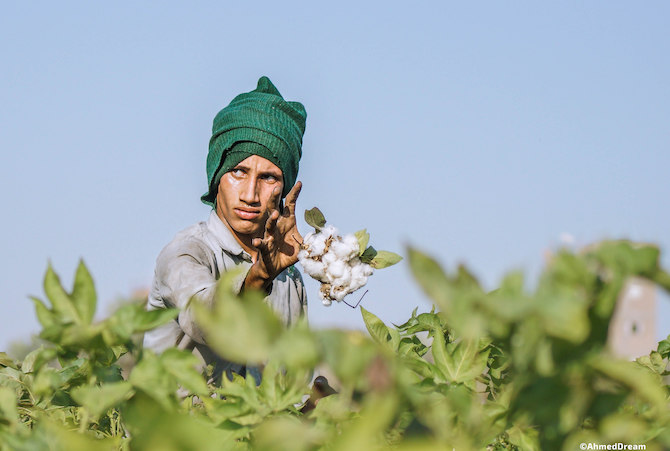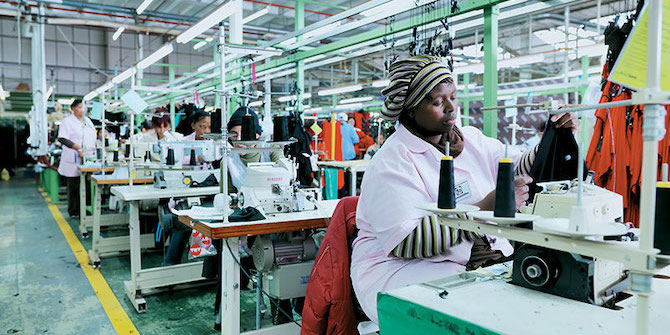by Rachel Alexander

Products sold by global brands and retailers are often produced in fragmented global production networks. These networks connect producers of intermediary components across multiple locations who may be using diverse materials and production practices. For example, a handbag could be made with Ethiopian leather and a Chinese zipper with the final stages of manufacturing in India. Sustainability challenges occur across all stages of these fragmented production processes.
Multiple sustainability related challenges and opportunities exist for producers connecting to global production networks. These producers can experience social, economic and environmental upgrading or downgrading. For example, a producer can face extreme time and cost pressures which result in a decrease in job quality and wages for production workers. Or, a producer can receive training from a global buyer about how to better motivate workers and thus increase productivity and job satisfaction.
Brands and retailers, as lead firms in global production networks, are often seen as being responsible for the production practices that take place in their extended supplier networks. Responding to a global need to improve the sustainability of production, lead firms have been developing sustainability related policies and making related changes to their sourcing practices. While the roles played by mass-market brands and retailers in shaping the sustainability of production processes have been the topic of much research, the roles played by luxury brands have been given far less attention. Relying on different production models, luxury brands can experience different dynamics when interacting with global producers, which can impact the roles that these brands play in promoting sustainable production.
Mass-market lead firms have been found to use a variety of approaches to promote sustainable production – developing supplier codes of conduct and standards (the dominant approach), capacity building, political advocacy, promoting best practices to encourage voluntary change, and building partnerships with suppliers. Considering the efficacy of lead firms’ efforts, numerous challenges have been identified. Research on consumer products produced through light manufacturing, such as clothing and electronics, has found that standard setting has not been very effective for promoting desired behaviours among suppliers. A recent paper highlights the difficulties that mass-market lead firms face when trying to influence lower-tier producers, with a key barrier being that long and complex production networks result in weak connections between lead firms and lower tier producers that compound challenges faced in closer relationships.
To understand production dynamics for luxury products, research on private governance for sustainability for mass-market production can be drawn upon to an extent, but production networks and pressures faced by luxury brands are significantly different than those faced by mass-market brands. Luxury brands produce similar products to mass-market brands but each item has a higher value. Furthermore, luxury brands often use premium raw materials and their high focus on quality can mean they have shorter and less complex supplier networks than mass-market brands. These simpler networks can involve more direct relationships and monitoring. Products can also involve higher levels of hand-crafted components.
Luxury brands have historically not faced the same pressures (targeted NGO campaigns about sweatshops, for example) as mass-market brands. Nevertheless, luxury brands have more recently started to follow their mass-market counterparts in embracing the sustainability agenda. The above-mentioned differences imply that producing for luxury brands can give suppliers different opportunities than producing for mass manufacturing, but more research is necessary to understand the different challenges and opportunities involved in production processes for luxury brands.
A case that may be promising for future research and action is Egyptian extra-long staple cotton. This is a premium raw material that can be incorporated into luxury products. This product presents two opportunities for luxury brands to promote sustainability.
First, luxury brands would have an opportunity to support Egypt in upgrading their global position in cotton production to capture more value from this unique product. As described by a recent pair of reports, Egypt produces some of the world’s highest quality cotton, but the majority of it is exported as a raw material. Egypt has an opportunity to harness greater value from this industry. While Egypt currently has textile and textile-based product manufacturers, these industries are currently focused on lower quality production, often using imported short-staple cotton. An opportunity exists for the country to begin using its own extra-long staple cotton to produce items for high-end and luxury brands. This is in line with the Egyptian government’s development strategy, which emphasises supporting the textile and apparel industries, and could create new business opportunities and new jobs.
Second, luxury brands can make direct connections to Egyptian cotton producers in order to support the use of sustainable practices. By looking to Egyptian extra-long staple cotton as an input, these brands can source a premium raw material in a country that has the potential to carry out all stages of manufacturing providing a production model which involves a short and simple supplier network. In such a network, lead firms could more easily connect to raw material producers compared to networks typically involved in mass-production. This close connection could help luxury brands to promote the use of more sustainable production practices and reduce the brands’ risk of problematic practices being used by unseen producers.
Furthermore, cotton is a product that can particularly benefit from lead firms actively seeking to improve the sustainability of production, as the processes involved often have high levels of pollution and poor working conditions. There are already a number of organisations and businesses in Egypt involved in producing cotton products using processes designed to overcome sustainability challenges. This means that luxury brands have the opportunity to support the expansion of these sustainable production processes while gaining access to a premium raw material.
Overall, the way that luxury brands interact with their suppliers has an impact on the sustainability of production. Current practices need to be studied further and numerous opportunities for luxury brands to promote more sustainable production practices can be explored. Moving forward a number of questions remain:
- What are the challenges and opportunities for suppliers connecting to luxury product production?
- How does connecting to luxury brands’ production networks impact economic, social & environmental upgrading in production sites (for businesses, workers, local communities)?
- How do governance relationships between lead firms and suppliers differ for luxury brands compared to mass-market buyers?
- How are luxury brands’ emerging sustainability policies evolving?
Thank you to Yoshua Wakeham for constructive feedback on an earlier version of this piece.
This is part of a series emerging from a workshop on ‘Mediterranean Production Networks and the Export Economies of North Africa‘ held at LSE on 17 January 2020. Read the introduction here, and see the other pieces below.
In this series:
- Introduction by Shamel Azmeh
- The Scandal of Seamless Linkages: Global Value Chains and Women Argan Oil Producers in Morocco by Kate Meagher
- Is Automation Stealing Manufacturing Jobs? Evidence from South Africa’s Apparel Industry by Jostein Hauge and Christian Parschau
- COVID-19, Digitalisation and Manufacturing-Led Development in African Countries by Karishma Banga
- Have North African countries upgraded and diversified in apparel and automotive GVCs? by Thomas Bernhardt
- Varieties of Digitalisation in Automotive Supply Chains and Upgrading Prospects of Supplier Firms by Merve Sancak







Good article which is worth reading it . Thanks for info.